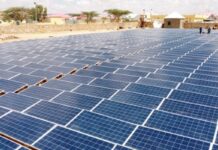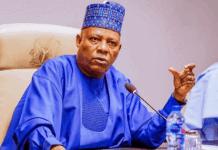•Company says not aware of such debt, traders pledge supply despite delays
•Nigeria to get $1bn balance of AfreximBank’s oil-backed loan next month
Chigozie Amadi
Nigeria is again running into troubled waters with mounting import bills , with the Nigerian National Petroleum Company Limited (NNPC) currently owing as much as $3 billion to fuel traders for imported petrol, three sources told Reuters.
The report stated that this has been exacerbated by the tumbling naira currency and rising global fuel prices, which have further increased the effective subsidy the country is paying.
But an NNPC spokesperson said the company was “not aware of any such debt nor any financial issues of such magnitude”, adding that “Our focus remains on sustaining sufficiency in the supply of petroleum products in Nigeria.”
THISDAY reports that Nigeria has for over a decade fully depended on petrol imports since none of its four refineries is currently refining the product. However, the NNPC has said that its 60,000 barrels per day Port Harcourt facility, which it said achieved mechanical completion in December last year, will soon come on stream.
But even at that, if the refinery finally starts production today, the output would be just a fraction of the country’s over 40 million litres daily need.
Also, the much-awaited 650,000 bpd Dangote refinery, near Lagos, is projected to significantly reduce petrol import initially and then lead to its total stoppage when it begins to operate at full capacity. The facility is expected to begin petrol throughput next month.
However, the Reuters report said the payment backlog is a blow to the government’s efforts in Africa’s largest economy to shore up its strained finances by curbing costly energy subsidies.
“They are paying, but it’s slow,” one of the sources with knowledge of the matter said. Five sources said that NNPC – the country’s main importer of petrol – was taking more than 130 days to make the payments instead of within 90 days.
NNPC’s suppliers, including international traders like Vitol, Mercuria and Gunvor as well as Nigeria-based trading houses, are still supplying fuel, the sources said. They declined to be named because they are not authorised to speak to the media. The trading firms declined to comment.
But the payment delays, the report argued, underscore the creeping return of fuel subsidies – scrapped in May 2023 – that sap NNPC’s cash for imports and what it can send to President Bola Tinubu’s government.
Nigeria had subsidised fuel for years to keep pump prices affordable, but Tinubu removed them as part of wider reforms, allowing prices to triple. Petrol consumption fell by around 30 per cent as higher prices curbed smuggling to neighbouring countries.
In June, the government capped pump prices at a nationwide average of N617 per litre as Nigerians grappled with punishing inflation.
“It’s hard to overstate the significance of fuel subsidies for the administration,” said Clementine Wallop, director for sub-Saharan Africa at political risk consultancy Horizon Engage.
“It was subsidy removal and exchange rate reform that had investors and lenders initially positive about his administration, and it was their removal Tinubu hoped would give his team the ability to spend in the many other areas that need funding,” he added.
Last week, motorists queued for petrol across Nigeria’s commercial capital Lagos, due to a shortage of fuel from depots. Head of the Major Oil Marketers Association (MOMAN), Clement Isong, said logistical issues over Easter caused the constraints, which would soon abate.
Oil industry sources said rising global petrol prices and a weaker naira had also impacted NNPC’s ability to import.
At their peak in February, market prices for petrol in West Africa were N1,229 per litre, 150 per cent above the level the government capped prices in June, according to pricing data from Argus Media converted with tracking site Aboxifx naira rates. They have since fallen to around N912 per litre, still N295 above the capped price, Reuters added.
“That left NNPC as the sole importer of the roughly 40 million litres per day the country consumes, as private importers cannot recoup their costs,” the report added.
Since the naira has slid against the dollar and oil prices have risen, NNPC is losing money on every litre sold, traders said.
The International Monetary Fund (IMF) recently warned that capping pump prices and electricity tariffs below cost recovery could shave up to 3 per cent off the Gross Domestic Product (GDP) in 2024.
“The government still needs to begin formulating a plan to remove the fuel subsidy when conditions allow,” Tellimer’s Patrick Curran said in a note.
Meanwhile, Nigeria, is expected to receive the balance of $1.05 billion loan from the African Export-Import Bank (Afreximbank) next month as part of a larger crude oil prepayment facility aimed at shoring up forex reserves and boosting the economy.
“The verification of the crude availability has happened, so we expect in the next month to finalise the release of the balance,” Senior Executive Vice President for Finance, Administration, and Banking at Afreximbank, Denys Denya, told Bloomberg. “Based on future production, you get the money now,” Denya added.
The outstanding is part of a larger, $3.3 billion, crude oil prepayment facility, sponsored by the Nigerian National Petroleum Company Limited (NNPC). Several reports had it in January that an initial disbursement of $2.25 billion was made by Afreximbank.
However, the second tranche of $1.05 billion was expected to be disbursed afterwards, meaning that Nigeria will now get the remaining in May.
Nigeria is expected to repay the loan using proceeds from sales of crude by the NNPC. The syndicated loan backed by oil by the end of May will help revive Nigeria’s economy and boost the supply of hard currency on the local foreign-exchange market.
The facility has participation from commercial banks and oil traders, most of which have already secured internal approvals, he said, without giving further details.
Nigeria has battled years of acute foreign-exchange scarcity arising from low crude production and a lack of economic diversification. Since coming to office in May, Tinubu has worked to address the shortages with a series of reforms aimed at attracting foreign investors and boosting economic growth.
They include the central bank clearing a $7 billion backlog of unmet foreign-exchange obligations to industries and foreigners, allowing the naira to trade more freely and increasing interest rates steeply.
In August 2023, the NNPC said it had secured the emergency crude repayment loan from the continental bank.
It stressed that the commitment letter, which was signed at the bank’s headquarters in Cairo, Egypt “will enable it to support the federal government in its ongoing fiscal and monetary policy reforms aimed at stabilising the exchange rate market.”
























